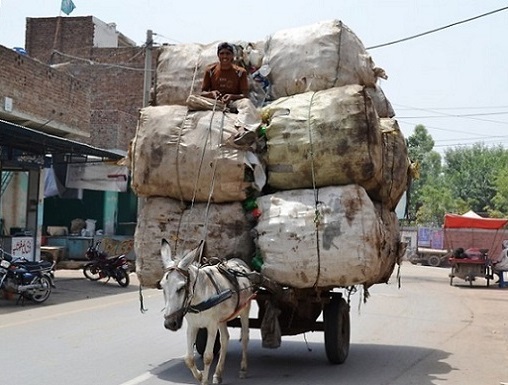(An ass or donkey pulling his heavy load)
Prabhupāda: Asat means either temporary or bad. Asat. Temporary or useless. So this material world is temporary, we can know it is. But it is useless, that we do not know. Therefore we struggle. "Let me go. Let me fight, fight, fight, fight." That is māyā. You know that? A man is sitting on the ass. And his hand just on the front of the gādhā, ass, he's putting some grass. And the gādhā is thinking, "I will eat this grass," so he's going forward. But the grass is also going forward. This is very instructive. The grass is, say, one feet above his head, and the man is sitting on his back. But because this gādhā does not know that "Actually, this man is sitting on my... as soon as I go forward, the grass also goes forward." But because he's ass, he does not know. He thinks that, "If I go a little forward I'll get the grass." But he has no knowledge that the arrangement is so made that as you go forward the grass also goes forward. Another example is that meerage. Myrage? There is no water.
Devotee: Mirage.
Prabhupāda: Mirage. There is no water; it appears there is water. And the animal goes forward and it goes forward, it goes forward. So this material world is like that. Ask anybody, any so-called successful. Unless he's an ass, nobody will say that this is very comfortable. So best thing is to become niṣkiñcana. Niṣkiñcanasya bhāgavata-bhajana... this is Caitanya Mahāprabhu's instruction. Bhāgavata-bhajana means niṣkiñcana. You make nothing this material world. That is real Kṛṣṇa consciousness. And so long I'll make this material world something, then I'll suffer. Best thing is make it... just like Draupadī. Draupadī, when she was grabbed in the assembly and Duryodhana and Karṇa wanted to make her naked... so generally woman, if you try to make her naked she'll try to save herself. So she was trying to save herself, and when she thought, "There is no way. My husbands are here. They are not helping, and... so cloth is being supplied by Kṛṣṇa, but how long I shall?" No, before Kṛṣṇa helping, she was trying to help herself. But when she found that it is not possible, then she did not try to save the cloth. She said: "Kṛṣṇa, save me!" Two arms. You have seen the picture. And then Kṛṣṇa supplied cloth. So it is, "Go on, yes, Duḥśāsana, you go on. You try to make her naked. I'll supply."
So this is Caitanya Mahāprabhu's instruction, that one should, if one is serious about bhagavad-bhajana, he should take it, whole material world, as nothing. Sometimes I think, "I made nothing this material world, and again retired in Vṛndāvana. Again, Kṛṣṇa, you have given so many things. What is the purpose?" At that time, I remember Rūpa Gosvāmī's instruction, "This is not mine. This is Kṛṣṇa's." Nirbandhaḥ kṛṣṇa-sambandhe yuktaṁ vairāgya. We are exerting so much energy to construct a temple, but as soon as we become implicated, "Now I have got this big building. Let me live very comfortably," then it is very dangerous. So long we work for Kṛṣṇa, it is Kṛṣṇa's, I am still nothing. And as soon as I take it, "Oh, now I have got very good, comfortable place. Make me again something," (laughs) take that as dangerous. Otherwise, there is no danger. Therefore we have to be engaged always in Kṛṣṇa's service. Not that, "Because we have got this nice building and income also, let us now sit down and eat." Then you'll stop. You shall have to be engaged always. Because our brain is materialistic, as soon as there is little chance of utilizing for sense gratification, mind: "Yes, yes. Do it." Still, we have to do it.
prāpañcikatayā buddhyā
hari-sambandhi-vastunaḥ
mumukṣubhiḥ parityāgaḥ
phalgu vairāgyam kathyate
(Bhakti-rasāmṛta-sindhu 1.2.256)
Rūpa Gosvāmī. Hari-sambandhi-vastunaḥ. Things which are connected with Kṛṣṇa, you should never think it that it is material. It is spiritual. Jagāi-Mādhāi... Caitanya Mahāprabhu asked him that "You make this nothing, this sinful activity. Then I accept you." They promised, "Yes." That's all. Sarva-dharmān parityajya mām ekaṁ śaraṇaṁ vraja ahaṁ tvāṁ sarva-pāpebhyaḥ (BG 18.66).
(Srila Prabhupada Conversation, Vrindavan, September 6, 1976)
.
.

